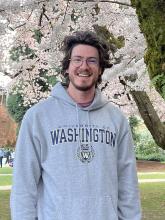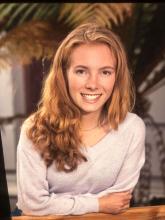Cooper Simpson was awarded the prestigious DOE Fellowship, and Josephine Thacher Noone was awarded the NSF fellowship.
Cooper Simpson:

I received the Department of Energy Computational Science Graduate Fellowship (DOE CSGF) in the Mathematics and Computer Science track, with Professor Aleksandr (Sasha) Aravkin as my advisor. The DOE CSGF funds doctoral students to pursue research in computational science and engineering (CSE) with a focus on enabling advances for high-performance computing (HPC). I plan to pursue research in complex large-scale optimization, leveraging second-order optimization techniques and randomized numerical linear algebra to develop principled algorithms and tools. Optimization problems are ubiquitous in modern CSE and an essential component of HPC systems. In the past I have worked on projects in large-scale data compression for scientific simulations and unconstrained non-convex optimization. I plan to continue and build upon these projects, as well as pursue new ones, such as my initial work at the University of Washington with Prof. Aravkin on improving convex optimization methods for piecewise linear quadratic (PLQ) objectives.

Josephine Thacher Noone:
Most recently, I have been working with Dr. Heather Wilber focusing on numerical analysis and low rank spectral approximation methods to solve PDEs. My research specifically involves approximating functions in terms of rank-1 pieces to create low rank approximations to a function. I am currently developing a class in the Chebfun software package in MATLAB called Halofun for computing with low rank functions on the 2D annulus.
During my junior year, I participated in the Women in Applied Math mentorship (WAMM) program where we focused on computing the eigenvalue spectrum of spatial operators associated with a PDE model, specifically the Schrödinger equation. We looked at both the finite section method and ultraspherical collocation method to compute the spectrum.
One of my first introductions to research was as a summer research assistant with Dr. Bamdad Hosseini. We focused on Markov chain Monte Carlo (MCMC) algorithms for solving Bayesian inverse problems and specifically, the random coefficient autoregressive (RCAR) algorithm. This algorithm is designed to deal with non-Guassian priors without the need to map the prior to a reference measure.
As a freshman, I participated in the Washington Directed Reading Program where I studied a leading book on applied category theory. I am very grateful to my professors and the graduate students and peers who have supported me and helped to create a vibrant community in the Applied Math department here at UW. With the NSF graduate fellowship, I'm excited to continue my studies at University of California San Diego in the Mathematics PhD program.